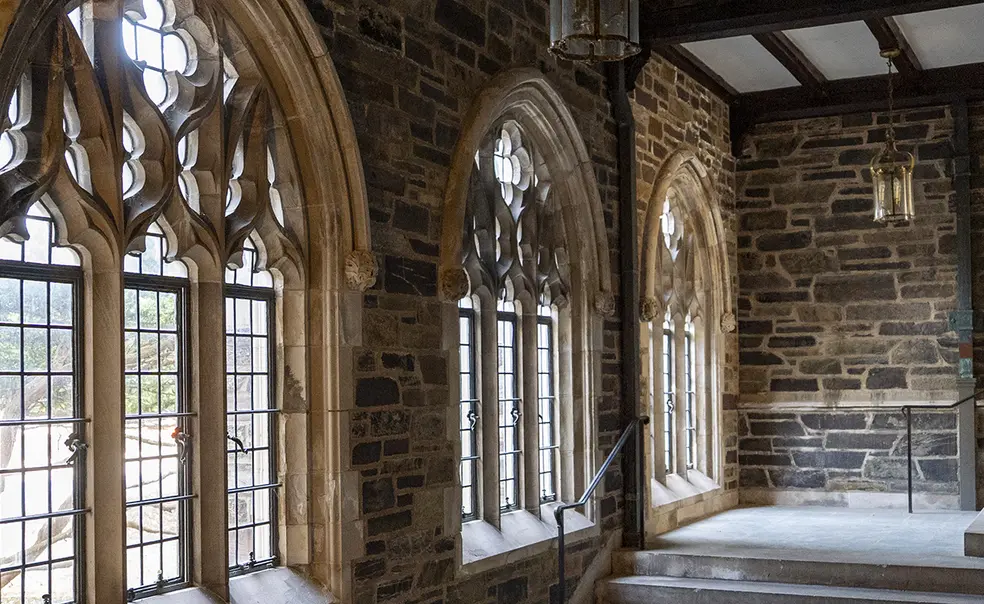Faculty Vote to Require Proposals to be ‘Actionable,’ Curbing Potential Statements
Princeton’s faculty agreed to adopt an amendment to the Rules and Procedures that requires proposals presented at faculty meetings to “be actionable within the context of University operations.” The amendment, proposed by the Ad-Hoc Committee on Faculty-Wide Statements, received overwhelming support from voting faculty April 28 at Richardson Auditorium.
The committee was established following the October 2024 faculty meeting, when votes on three proposals related to faculty advocacy were punted to the April 28 meeting.
The first of those three other proposals on the agenda was proposed by the Council on Academic Freedom (CAF), a group of about 60 faculty members promoting “freedom of inquiry and expression” and “intellectual tolerance.”
That proposal would have amended the Rules and Procedures of the faculty so that “proposals presented at faculty meetings for a general vote of the faculty must pertain to matters of university governance.”
Another proposal called for a committee of faculty to evaluate the University’s response to pro-Palestinian protests last spring, and the third called on the University to establish an “initiative to support and advocate for Palestinian, Arab, and Arab-American students, faculty, and staff.”
Instead, the votes were postponed to April. At the December faculty meeting, nominations were taken for the newly established Ad Hoc Committee on Faculty-Wide Statements, whose task was to explore faculty attitudes towards faculty-wide statements.
Prior to the April meeting, the Faculty Advisory Committee on Policy advised University President Christopher Eisgruber ’83 to hold most of the measures referred from October “as void.” Eisgruber accepted this recommendation at the April 28 meeting, and no members of the faculty asked any questions.
The committee, led by Claire Gmachl, a professor of electrical and computer engineering, circulated both a proposal and a report detailing rationale for the proposal prior to the April 28 meeting.
The committee posited that Section II.C.2 of the Rules and Procedures of the Faculty be amended so that, “proposals presented at faculty meetings for a vote … must be actionable within the context of university operations …,” articulating that proposals must recommend action by members of the University with “relevant delegated authority,” rather than “statements expressing a position or belief.”
Eleven members of the faculty asked questions or made comments about the proposal, including a moving personal statement from Professor Mansour Shayegan. In 1980, when he was a first year graduate student, President Jimmy Carter signed an executive order expelling Iranian students from the country as a result of the Iranian hostage crisis.
Shayegan explained that faculty-wide statements and action from the faculty of MIT helped change Carter’s mind and allowed him to stay in the United States.
“As a consequence of these meetings, MIT and other universities sent a delegation to Washington to persuade the current administration to reverse the order and allow the Iranian students to stay in the U.S. and finish their ultimate degrees,” he said. “This was successful and allowed me to stay and finish my Ph.D. I will never forget this event. I feel I owe my education, my career … and even my wife, who was my girlfriend in 1980, to the collective voice and action of my professors at MIT.”
Gyan Prakash, a professor of history, said that he had not received a satisfactory answer from the committee about who determines which social and political issues “affect the functioning of the University or not.”
“The second is that this recommendation comes against the background of the genocide in Gaza, and it's clearly an attempt to prevent the fact that people say anything about it, and so we are pretending as if this comes in some kind of a vacuum,” he said.
Antoine Kahn, a professor of electrical and computer engineering, said that Prakash’s comment emphasized why he supported the proposed amendment.
“I think that the type of statement that is made, or that was made is so broad and so controversial that it is exactly what this body of faculty should avoid,” he said.
Professor Alan Patten from the politics department and the University Center for Human Values asked whether statements in support of students would be out of bounds based on the proposed amendment.
“So suppose that the government were to announce that some category of our students were required to leave the country by the end of the academic year, and the faculty wanted to assemble to make a statement deploring that action. Would that be ruled out by this policy?” he asked.
Gmachl didn’t directly respond to Patten’s query, but in a reply to another faculty member who echoed his question, she said that “such statements would be all right.”
The faculty voted unanimously to end discussion, and then voted overwhelmingly — about 80 percent in favor — for the proposed amendment.
No one motioned to bring the other proposals postponed from October to the floor for a vote.












No responses yet